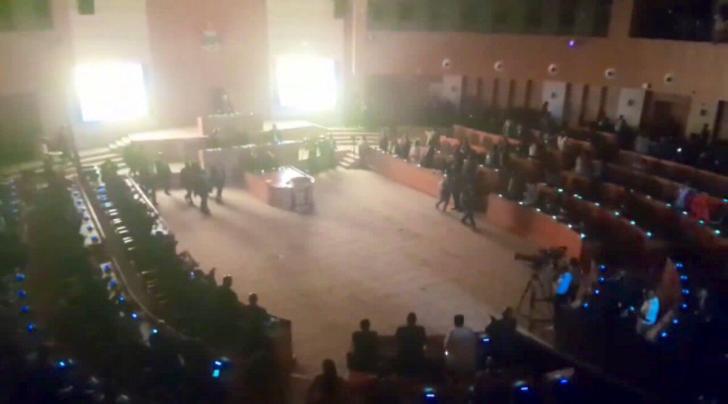News / National
Mnangagwa leaves Parliament in darkness
29 Nov 2024 at 07:18hrs |
16 Views

President Emmerson Mnangagwa walked out of the New Parliament Building in total darkness on Thursday, underscoring the severity of Zimbabwe's ongoing electricity crisis. The 82-year-old Zanu-PF leader had just attended the 2025 National Budget presentation by Finance Minister Mthuli Ncube, when the entire Parliament precinct was suddenly plunged into a power outage.
The unexpected blackout highlighted the nation's deepening energy crisis, with rolling power cuts affecting Zimbabweans daily. Despite this, Ncube's budget proposal allocated a mere ZiG259 million to the Ministry of Energy for the coming year, prompting further criticism from opposition legislators and citizens concerned about the lack of a comprehensive plan to resolve the crisis.
Leslie Mhangwa, a legislator from the Citizens Coalition for Change (CCC) who represents Chinhoyi constituency, condemned the government's handling of the energy sector. He warned that Zimbabweans should expect longer periods of electricity shortages unless serious structural changes were made.
"It is evident that the government has abdicated the responsibility of energy to private players," Mhangwa said. "The only thing that is being done is the deferment of VAT, but the elephant in the room, which has not been addressed, is that energy should be sold in US dollars, especially for industries. This is cheaper for businesses. We are not prepared for long-term energy planning, and frankly, there's nothing to write home about. We will continue in darkness."
Currently, many parts of the country are experiencing power outages lasting over 15 hours a day. The Zimbabwe Electricity Supply Authority (ZESA) and the government have cited breakdowns in key power plants, including Hwange, and low water levels at the Kariba Dam as the main causes of the frequent power outages.
Edwin Mushoriwa, CCC MP for Dzivarasekwa, also criticized the government's approach, particularly the budget allocation for the energy sector. Mushoriwa expressed disappointment that Ncube had failed to propose meaningful incentives to tackle the crisis, such as suspending duties on alternative energy solutions like solar power, which could provide immediate relief.
"The minister failed to come up with incentives that could have alleviated the energy shortages," said Mushoriwa. "We had hoped that with the suspension of duties on certain items, solar and other alternative energy mechanisms would be included, but the budget allocation for energy is just not enough."
The energy crisis continues to be one of Zimbabwe's most pressing issues, with the government facing growing pressure to take decisive action to address the country's electricity shortfalls and explore sustainable solutions. Critics argue that without a long-term, multi-faceted strategy, the situation will only worsen, leaving citizens to endure prolonged periods of power outages.
The unexpected blackout highlighted the nation's deepening energy crisis, with rolling power cuts affecting Zimbabweans daily. Despite this, Ncube's budget proposal allocated a mere ZiG259 million to the Ministry of Energy for the coming year, prompting further criticism from opposition legislators and citizens concerned about the lack of a comprehensive plan to resolve the crisis.
Leslie Mhangwa, a legislator from the Citizens Coalition for Change (CCC) who represents Chinhoyi constituency, condemned the government's handling of the energy sector. He warned that Zimbabweans should expect longer periods of electricity shortages unless serious structural changes were made.
"It is evident that the government has abdicated the responsibility of energy to private players," Mhangwa said. "The only thing that is being done is the deferment of VAT, but the elephant in the room, which has not been addressed, is that energy should be sold in US dollars, especially for industries. This is cheaper for businesses. We are not prepared for long-term energy planning, and frankly, there's nothing to write home about. We will continue in darkness."
Edwin Mushoriwa, CCC MP for Dzivarasekwa, also criticized the government's approach, particularly the budget allocation for the energy sector. Mushoriwa expressed disappointment that Ncube had failed to propose meaningful incentives to tackle the crisis, such as suspending duties on alternative energy solutions like solar power, which could provide immediate relief.
"The minister failed to come up with incentives that could have alleviated the energy shortages," said Mushoriwa. "We had hoped that with the suspension of duties on certain items, solar and other alternative energy mechanisms would be included, but the budget allocation for energy is just not enough."
The energy crisis continues to be one of Zimbabwe's most pressing issues, with the government facing growing pressure to take decisive action to address the country's electricity shortfalls and explore sustainable solutions. Critics argue that without a long-term, multi-faceted strategy, the situation will only worsen, leaving citizens to endure prolonged periods of power outages.
Source - NewZimbabwe
Join the discussion
Loading comments…





























